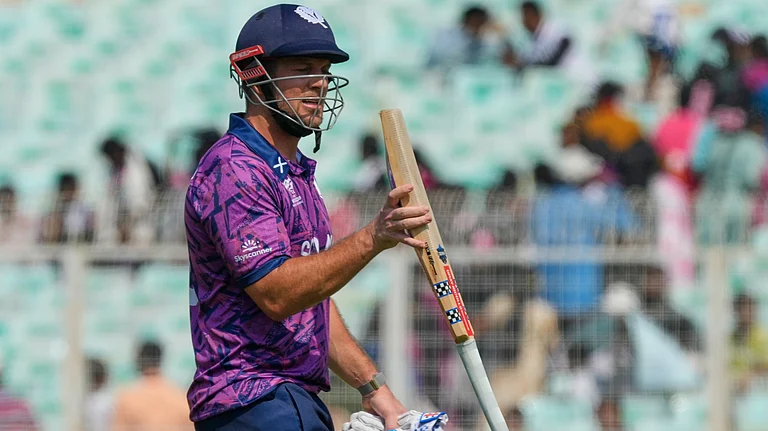GEORGE Fernandes is a man who believes attack is the best form of defence. In a blizzard of accusations, the defence minister has buried five specific grounds for sacking the chief of naval staff: that he repeatedly defied the authority of government; that he violated the Navy Act by trying to harm the career of his subordinates; that he lied to the government on matters where he should have kept it briefed; that he was mentally unbalanced, habitually flew into a rage and threatened junior officers; and, most serious, that he endangered national security by leaking information to two newspapers. Not one of these hold up under serious scrutiny.
As an example of Bhagwat's "direct challenge to the government's authority", Fernandes cited naval HQ's refusal to give an explanation for transferring an assistant naval attache from Moscow a year before his term and its observation that "the NHQ considers it inappropriate that a deliberate and committed decision of the chief of naval staff should be questioned". But as the letter wasn't addressed to the minister, it can't be termed a direct challenge to civilian authority. Besides, NHQ's stand was constitutionally correct. Under the Navy Act, only appointments of the rank of captain and above need government endorsement. The concerned officer was a commander. Reading between the lines of Fernandes' own statements, it's clear NHQ suspected the officer was involved with Indian arms dealers in Russia. But without strong proof it didn't wish to enter this on his confidential report. Instead it transferred him out. It was well within its rights and the MOD was out of bounds in questioning it. According to a committee convened by NHQ's new chief, Admiral Sushil Kumar, on March 4, Bhag-wat committed no irregularity when he recorded his views of an officer on a CR given to Commodore Contractor by his predecessor, Adm Shekhawat. It also exonerated him of irregularity in reviewing the ACRs of six senior officers. Fernandes obviously does not agree.
Fernandes' charge that Bhagwat compromised India's security by talking about the country's nuclear submarine project when its existence was not acknowledged by the government, and that he did so because he was miffed at the government's decision to extend the tenure of the man in charge of it, is ludicrous. Bhagwat has pointed out that one can retrieve over 700 news reports on the ATV project from the Internet. I can add that I've known about the project, the design of the reactor and the snags it has hit, for over a decade, entirely from published data. Articles suggesting the reactor design problems had been overcome appeared in a major US newspaper soon after the Pokhran-II blasts.
Three charges, including the most serious—of lying to the government—centre around Adm Kumar. Fernandes alleged that Bhagwat refused to furnish details on why Kumar was denied an operational command and was relegated to the training command in Kochi; and lied when asked if Kumar had made any 'representation' to him against his posting. Bhagwat replied in writing that there was no such representation. Fernandes also circulated a letter from Kumar to him dated December 2, alleging that Bhagwat had threatened him with court-martial for lodging a protest with the MOD.
The gravity of the charges leaves me no option but to tell the entire story, as I have pieced it together. In contrast to Bhagwat, Adm Kumar was on good enough terms with former defence secretary Ajit Kumar for the latter to prevail upon the cabinet secretariat to hold up a file with appointments to the three naval commands from November '97 to January '98, while he tried to get Adm Kumar's Kochi posting can-celled. The MOD decided at the end of July 1998 to implement the increase in retirement age for rear admirals and above, subject to a maximum age of 62. Kumar, just days away from retirement, gained a two-year extension and renewed attempts for an operational command, without which he'd be out of the running for the CNS post. When calls and unofficial letters to the CNS had no result, on October 7, '98 he sent in a statutory representation to the NHQ requesting the transfer. Kumar, however, withdrew the representation on October 30, when he came to Delhi for a meeting. He did so in the CNS' room in the presence of two senior officers, the C-in-C of the western command, and the vice chief Adm Jacob. Bhagwat endorsed the retraction and showed it to all three.
HOWEVER, on the very same day, Ajit Kumar wrote on behalf of Fernandes, asking him why it was not possible to transfer Kumar to an operational posting. He also asked why the C-in-C southern command shouldn't be considered for the CNS position, as in '84 Adm Dawson had become CNS from that post. Kumar did not know that in '84 Kochi was still an operational command. It became a training command only in '86. Bhag-wat was, therefore, correct when he wrote on November 9 that there was no representation before him. This letter is significant as it shows that on October 30, the MOD had chosen Kumar to succeed Bhagwat though Bhagwat had 11 months before he retired. The December 30 coup was, therefore, already in an advanced stage of planning.
Lastly, Bhagwat did bawl out Sushil Kumar for a breach of faith when he returned from Bangladesh on November 28 to find that Kumar had broken navy regulations and sent a complaint dated November 24 to the defence minister. But he did not do so at 1700 hrs on November 27. At that time Bhagwat was in the air between Dhaka and Delhi. The dates are significant. From November 24 to 28 Fernandes was in Mangalore being hosted by the southern command. That is when Kumar wrote to him. Only a day later, Kumar, in Fer-nandes' words, "telephoned me in a panic—I said, 'I am alive, don't worry'". I leave readers, including, one hopes, Mr Atal Behari Vajpayee, to draw their own conclusions.























